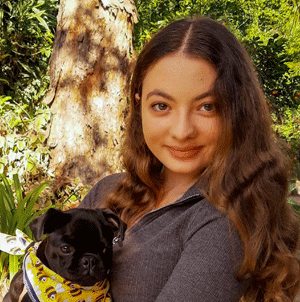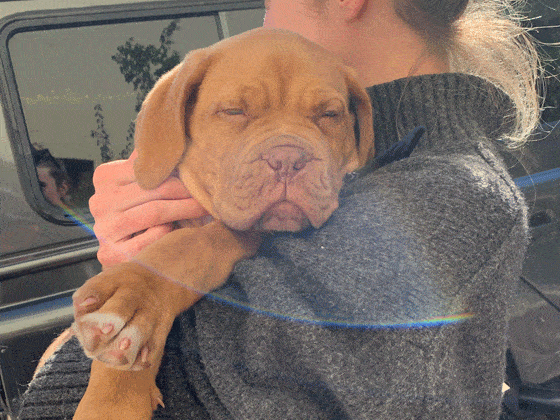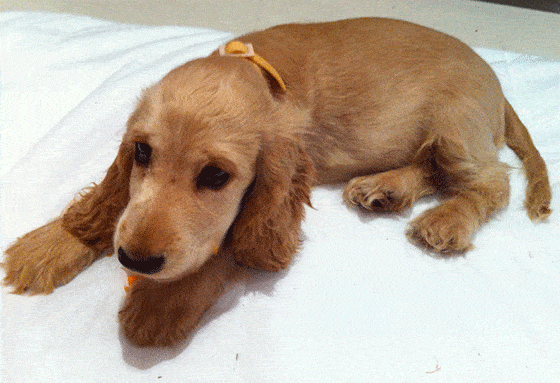Getting a new puppy can be like stepping into a whole new world. There are new rules, schedules and guidelines to follow. And it can be hard to remember all the little details, so in this article we’ve answered some of the most frequently asked puppy feeding-related questions.
By the way, we suggest products that we believe benefit our community of dog owners. Any links on this page that lead to products on Amazon are affiliate links and I earn a commission if you make a purchase.
If there is a best time to spend more money on your dog’s diet it’s when they’re a pup. Puppies need a specifically balanced diet full of the essential nutrients to promote healthy growth.
What's the best puppy food?
When you first get your new pup it’s best to continue the diet their breeder or kennel was supplying.
New puppies have sensitive digestive systems and need consistency to ensure as little disruption to their routine and stomach as possible. Be sure to ask the breeder or previous owner what brand and specific range they were fed.
After welcoming my puppy, Pierre, he encountered several health challenges and deformities that required multiple surgeries in his first year. Ensuring his food supported recovery and long-term health was crucial. Through extensive research, I identified foods offering optimal nutrition, and here’s what I discovered.
| Best Grain Free Puppy Food | small to medium-sized dogs | Ivory Coat Grain-Free Dry Dog Food Puppy Chicken |
| large breed puppies | Ivory Coat Grain-Free Dry Dog Food Large Breed Puppy Lamb With Coconut Oil | |
| Best Dry Puppy Food | all breeds | Purina Pro Plan Focus Puppy Chicken & Rice Formula Dry Dog Food |
| Best Canned Puppy Food | all breeds | Optimum Puppy Chicken And Rice Cans Wet Dog Food |
What's the best grain free puppy food?
Ivory Coat Grain-Free Dry Dog Food for Puppies – different ranges for different size breeds
Both natural and grain-free, this dry food is packed with essential high-quality Australian ingredients to support your growing puppy’s development.
And it’s good to know this puppy food is also free from corn, meat by-product, wheat, soy, artificial colours, flavours and preservatives.
- For small to medium-sized dogs try Ivory Coat Grain-Free Dry Dog Food Puppy Chicken
- For large breed puppies try the Ivory Coat Grain-Free Dry Dog Food Large Breed Puppy Lamb With Coconut Oil
What's the best dry puppy food?
Purina Pro Plan Focus Puppy Chicken & Rice Formula Dry Dog Food– suitable for all breeds
A dry food specifically designed for puppies and suitable for all breeds. It contains essential vitamins and minerals the pups need to help their growth and development. It also has prebiotics to aid digestion and support gut health.
And, good to know, it’s good value for money as you can buy the kibble in large quantities without worrying about shelf life issues.
What's the best canned puppy food?
Optimum Puppy Chicken And Rice Cans Wet Dog Food – suitable for all breeds
Optimum was my puppy’s diet for his first few months, we had no problems with it, and he loved it! It’s ideal for all breeds and dogs between 2 and 12 months of age.
It’s Australian made with calcium, proteins and prebiotics which are necessary for helping your pup grow.
And, good to know, it contains no artificial colours or flavours. To make the wet food purchasing more affordable, you can buy the cans in bulk online.
Should I make my own puppy food?
Cooking and preparing your own dog food might seem like the best idea, its hard to meet all their nutritional needs with a homemade diet. Like baby formula, puppy food is specifically crafted and researched to best suit the needs of your developing pup.
For these reasons, it’s suggested that you are better to invest in quality commercial pet food over homemade meals and raw diets for your new pup.
What are the best puppy food brands?
Purina, Optimum, and Ivory Coat. They’re recommended because they cater to the specific nutritional needs for this stage of growth.
How often should I feed my puppy?
In the first few months, puppies grow at an extremely fast rate, so their bodies can’t go long periods without food.
Puppies need regular, smaller sized meals, usually 3 times a day.
A pup’s diet can greatly influence their growth. Although fast development of a puppy is expected, overfeeding your pup can lead to growth issues, abnormalities and arthritis.
It’s important to read and follow the portion guidelines on your puppy’s food packets. If you’re concerned about your puppy’s diet or rapid growth rate, please consult your vet.
When does my puppy’s feeding schedule change?
Changing the feeding schedule depends on your pup’s breed, size and needs. But you can start considering dropping back mealtimes to twice a day once pups reach about 16+ weeks.
Transitioning mealtime can be tough. If you’re having any issues or are unsure about your pup’s needs make sure you consult with your vet.
What to do if my puppy is hungry but it’s not mealtime?
It can be very tempting to give in and feed your little pup if he’s barking, nagging or giving you the innocent ‘puppy-dog-look’.
But be careful – you mustn’t let your pup get his way too often as this can lead to behaviour issues or overfeeding.
It’s better for your dog’s health (and your bank account) if you feed your puppy natural, healthy options like fruits and vegetables rather than commercially made treats. If your puppy is hungry and it’s not mealtime feel free to give them a dog-friendly healthy snack like cucumber, carrot, banana green beans or watermelon.
Don't overfeed your pup
If you’re confused or worried about your puppy’s eating habits take comfort in knowing you’re not alone! There are so many options and things to keep track of when a new pup joins your home..
Remember to follow the guidelines and be careful to not overfeed. If you have any concerns about your puppy’s diet, consult with your vet for expert advice. And if you’re having any trouble getting your pup to sleep, you might be interested in this article on Mastering puppy’s sleep.
You might also like
 Long Handled Dog Pooper Scooper Set
Long Handled Dog Pooper Scooper Set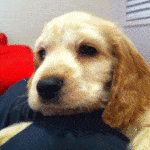 Mastering Puppy Sleep : Tips for a Restful Night
Mastering Puppy Sleep : Tips for a Restful Night Pain Relief Options For A Dog With Arthritis
Pain Relief Options For A Dog With Arthritis How to Clean Dog Bedding and Shampoos
How to Clean Dog Bedding and Shampoos Best Dog Poo Bags – Compostable, Biodegradable, Scented and Budget Priced
Best Dog Poo Bags – Compostable, Biodegradable, Scented and Budget Priced How to Help Your Puppy Settle Quickly
How to Help Your Puppy Settle Quickly How to Get Your Dog to Sleep Later in the Morning
How to Get Your Dog to Sleep Later in the Morning Most Dangerous Foods for Dogs and 5 of the Best
Most Dangerous Foods for Dogs and 5 of the Best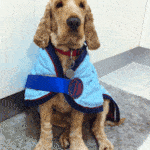 How to Help a Dog with Arthritis
How to Help a Dog with Arthritis What Food is Best for my Dog?
What Food is Best for my Dog?

